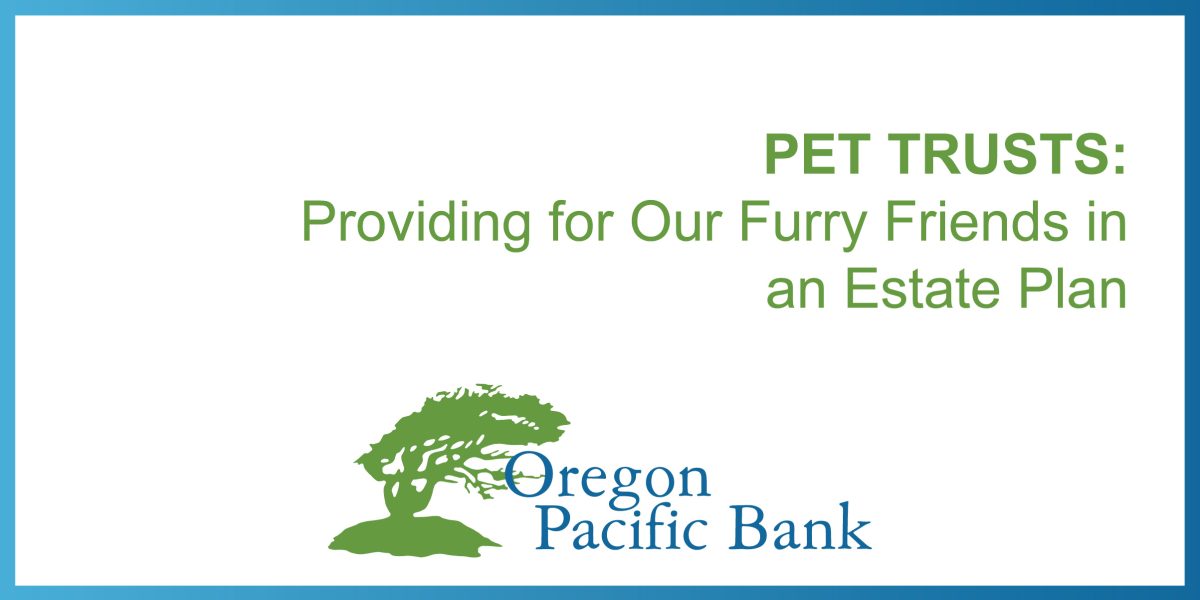Pet Trusts: Providing for Our Furry Friends in an Estate Plan
Pet Trusts are a valuable planning tool to provide for the care and welfare of our animals in the event of our disability or death. From reptiles and rodents to hounds and horses, all pets can benefit from a well-crafted plan to provide financial support and wellness oversight. Here are a couple examples from our files.
SARAH AND BAILEY
Sarah adopted a puppy two years before she was diagnosed with early onset Alzheimer’s disease. She was 55 years old.
She reached out to a qualified trust and estate planning attorney. She explained that she was unmarried, had no children, and had accumulated significant wealth over the course of her career and by way of her real estate investments. It was important to her that upon her death, her wealth would distribute outright in equal shares to her niece and to her favorite charity, a local no-kill shelter.
Lastly, she emphasized that her primary objective was to ensure that her young dog, Bailey, would be placed in a loving, family home where she would be safe and secure for her lifetime. She intended to leave a sizable sum in trust for Bailey to ensure that outcome. Once Bailey passed away, what remained of the trust funds would distribute outright to her niece and to the shelter.
This plan posed a dilemma. Both Sarah’s niece and the no-kill shelter offered to take Bailey in. However, these options were not necessarily in Bailey’s best interest as both parties were remainder beneficiaries and stood to inherit in the event of Bailey’s death.
Consequently, the attorney incorporated a Pet Trust into the estate plan and appointed a neutral, professional Trustee. A Pet Trust is a legally sanctioned arrangement providing for the care and maintenance of one or more companion animals in the event of a grantor’s disability or death. The trust instrument allowed for broad discretion in selecting Bailey’s future living circumstances. After identifying and screening prospective homes, she was placed in a home on five, fenced acres with a family of four. The children were mature and responsible enough to be entrusted with Bailey’s care.

Trust funds were invested according to Bailey’s life expectancy and income requirements. The assignment of an Income and Growth objective also contemplated the needs and expectations of the remainder beneficiaries. The trust officer conducts annual site visits to ensure that Bailey is enjoying absolute quality care.
Sarah’s careful planning, along with her skilled attorney, and their mutual decision to create a Pet Trust and appoint a professional trustee guaranteed Bailey’s happiness and safety for her lifetime – providing Sarah tremendous peace of mind in her final months.
TODD AND HIS HORSES
Todd owns an equestrian estate on sixty acres. A retired executive, he was recently widowed and now dedicates all his time conditioning and caring for the four horses he and his wife bred, raised, and trained. The horses are all between the ages of ten and twenty years old and, with good veterinary care and attention, can expect to live into their thirties.
Of utmost concern to Todd is the future of the horses should they outlive him, particularly given his wife’s recent death. Todd is in his late seventies and is on a pacemaker. Todd had a complete estate plan already in place– but the plan did not provide for his beloved horses. He reached out to his attorney to explain his concerns, specifically that the horses remain on his property for their lifetimes, and create a plan.

Todd’s property was zoned for five-acre minimum parcels. There existed on the property an established caretaker’s cottage which is occupied by a husband-and-wife team who maintain the grounds, assist with the day-to-day management of the estate, and care for the horses in Todd’s absence. Todd and his attorney’s firm initiated a subdivision and spun off the five acres which included the caretaker’s cottage, barn, and paddocks. The existing family trust was amended to accommodate the new plan.
Upon Todd’s death, all assets will be liquidated except for the caretaker’s cottage and barn on the five acres. A sub-trust will be funded with the five-acre property and $500,000 in cash and will be administered by a corporate Trustee. The trustee will manage the investments to generate income to offset expenses related to employing the caretakers, managing the property, and caring and feeding the horses for their lifetimes. The trustee will be responsible for oversight of the caretakers and replacing them if circumstances dictate; as well as ongoing monitoring of the quality of care shown to the horses. Upon the death of the last surviving horse, the property, which is expected to have appreciated significantly, is to be sold and the proceeds donated to a local horse sanctuary.
This plan is admittedly complex and was only viable due to the significant resources available to the grantor. A simpler, less costly option might be to fund a trust with sufficient funds to cover the costs of a boarding facility for the life of the horse. Boarding facilities often negotiate ‘leases’ for people who wish to enjoy the use of a horse while not actually taking ownership. This is an effective way to offset expenses and allow the horse to enjoy recreation and attention. These arrangements would be supervised by the corporate Trustee appointed to administer the trust and guarantee the horse’s quality of life.

Cats and dogs are the most common pets and, with an average life span of 10 years, planning for their care is straightforward. However, for non-traditional pets such as turtles and birds, who have life expectancies of 50 years or more, additional consideration is needed to provide for their wellbeing. A pet trust with a corporate trustee is the perfect solution to manage finances and oversee caretakers for the benefit of these special, long-lived critters.
If a pet trust is not feasible; consider giving your successor trustee or personal representative discretion to make a reasonable cash gift to any party willing to take on the custody and care of your pet. One of our clients directed by way of his Last Will a $1,500 cash bequest per mini donkey (he has four) to any person willing to provide one or more of them a loving home. His hope is that the funds will help get them established in their new homes.
There are endless variations on the theme of pet trusts, but it is important to consider the needs of your furry friends in the event of your death or disability. We recommend you discuss your wishes and intentions for your pets with your estate planning professional.





